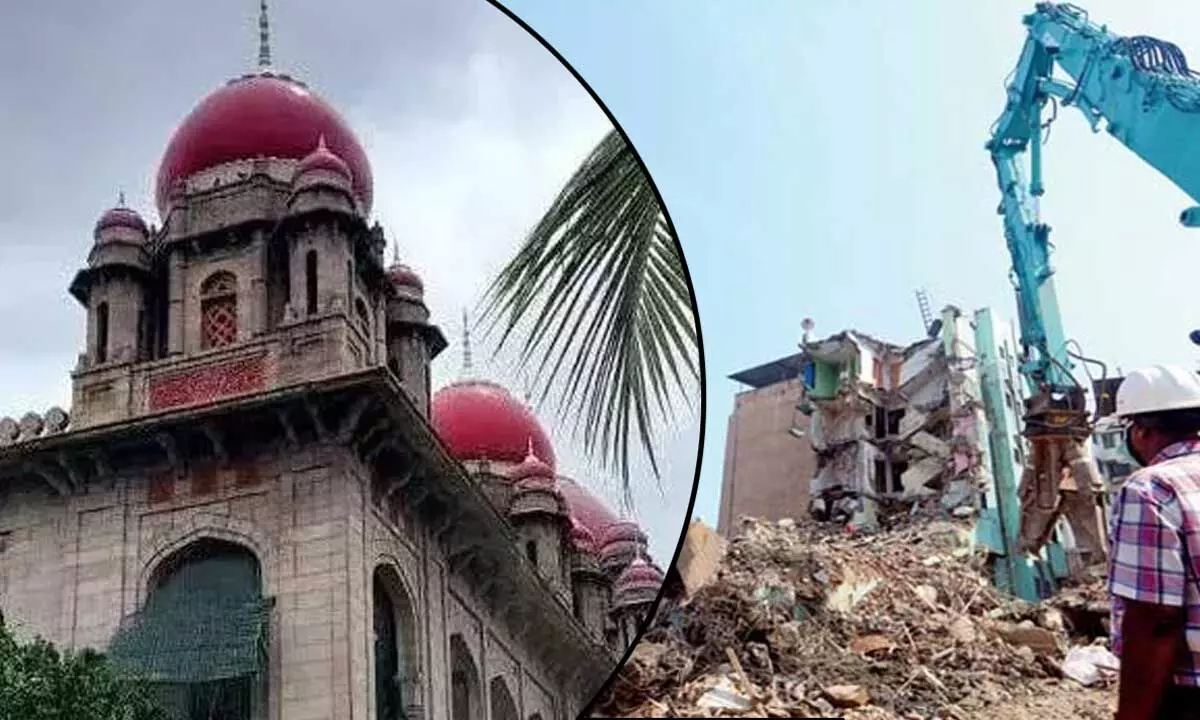Telangana High Court has restrained the Hyderabad Disaster Management and Asset Protection Agency (HYDRAA) from demolishing under-construction structures on the outskirts of the city without following due legal procedure. The ruling has brought to light the complexities of land ownership, planning permissions, and urban enforcement practices in rapidly expanding peri-urban zones such as Pedda Amberpet.
The court’s direction came in response to a petition filed by landowners who claimed to possess valid building permissions for their two-acre parcel, sanctioned by the Hyderabad Metropolitan Development Authority (HMDA). The petitioners alleged that despite compliance with regulatory processes and having responded to a HYDRAA notice, they were being threatened with demolition without formal adjudication or opportunity for hearing. Officials from HYDRAA informed the court that they had issued a notice in early June based on complaints regarding an unauthorised layout. The petitioners were asked to submit documentary evidence to validate their legal right to the land and construction activity. However, the petitioners contended that demolition activity was initiated before the agency took any final view on their response—effectively bypassing the procedural safeguard of natural justice.
The high court took note of the conflicting claims and ruled that HYDRAA must not proceed with any demolition or dispossession action unless all legal formalities are fully complied with. The judgment has sparked wider conversations around how regulatory bodies balance urgent civic enforcement with the rights of private citizens, especially in the context of development and disaster mitigation in suburban belts. This episode assumes significance as Hyderabad continues to push its urban boundaries. The government’s thrust on safeguarding natural water bodies, nalas, and public assets has led to the formation of dedicated bodies like HYDRAA, tasked with protecting key infrastructure from encroachments. However, the question remains: Can enforcement be effective without infringing on legitimate property rights or flouting due process?
Legal experts say that such situations are not uncommon in urbanising regions. As city limits blur and land value soars, regulatory overlaps between planning authorities, civic bodies, and enforcement wings can often lead to ambiguous or contested actions. In this case, the presence of a sanctioned plan from HMDA—a recognised planning body—was central to the petitioners’ argument that their development was lawful. At the core of the case lies the demand for procedural fairness. The petitioners highlighted that despite receiving a notice from HYDRAA, and submitting their response within the prescribed timeline, no order had been passed acknowledging or rejecting their claims. Instead, the threat of demolition was reportedly made verbally, creating a climate of fear and legal uncertainty.
Urban governance experts caution that failure to maintain transparency in such actions could erode public confidence in regulatory institutions. They argue that every agency—no matter how urgent its mandate—must operate within the constitutional bounds that safeguard property rights and procedural justice. The court’s ruling reiterates this principle and signals the need for checks and balances even in cases where public interest and environmental protection are cited. The Hyderabad Metropolitan Region has been under growing pressure from both sides of the development-environment spectrum. On one end, city expansion demands new housing, roads, and social infrastructure; on the other, unregulated sprawl has encroached upon vital drainage systems, lakes, and buffer zones, contributing to recurring urban flooding and ecological degradation. Agencies like HYDRAA were formed to address these challenges by reclaiming and protecting public lands.
But the Pedda Amberpet case reveals the tightrope walk that authorities must undertake. Enforcement without transparency risks backlash and litigation. Conversely, unchecked illegal layouts and unauthorised construction can undermine years of investment in flood control and urban planning. In this instance, the High Court stopped short of granting the petitioners permanent protection. Instead, it reminded HYDRAA that no coercive action could be taken without observing all legal norms, including issuance of reasoned orders and allowing for appeals. This ensures that the rights of individuals are not trampled in the name of civic order, and that state power is exercised judiciously.
Local residents in Pedda Amberpet, where real estate activity has surged due to its proximity to the Outer Ring Road and proposed infrastructure corridors, have voiced concern over such disputes. For many, clarity in land titles, planning approvals, and enforcement timelines remains elusive. They are now looking to this case as a precedent for how civic bodies should engage with citizens, especially when invoking drastic measures such as demolition. For Hyderabad’s planners, this case underscores the need to enhance coordination between HMDA, HYDRAA, and other civic bodies. Uniform databases, digitised permissions, and real-time dispute resolution frameworks could reduce friction and improve the transparency of enforcement drives.
As the city continues to prioritise sustainable and equitable development, this ruling reinforces the importance of aligning enforcement with ethics, legality, and empathy. The goal of zero net carbon and eco-friendly urbanisation must not bypass fundamental principles of justice and equity. While HYDRAA’s intention to protect civic infrastructure is aligned with broader urban sustainability goals, its methods must adhere strictly to legal and democratic standards. The judiciary’s role, as demonstrated in this instance, remains vital in ensuring that the rule of law remains central to Hyderabad’s urban transformation journey.
Whether this legal setback serves as a course correction for HYDRAA or becomes another flashpoint in Hyderabad’s evolving land-use landscape, one thing is clear: building climate-resilient and citizen-centric cities demands more than just bulldozers and notices—it requires trust, fairness, and accountability.
Also Read : Hyderabad Launches Major Anti Encroachment and Nala Cleanup Drive Before Monsoon




